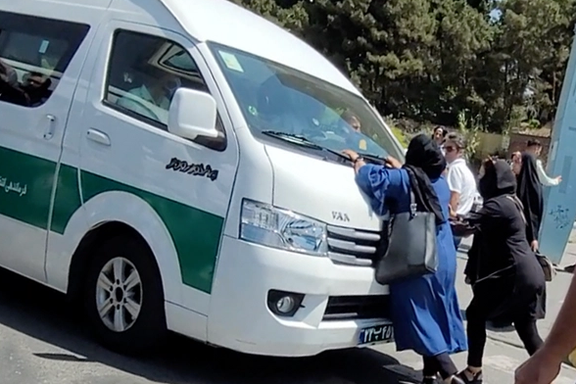Hijab Incidents Continue In Iran As Some Deny Police Action

A high-profile hardliner has denied the existence of hijab patrols in Iran, saying the opposition is highlighting isolated cases as “psychological warfare”.

A high-profile hardliner has denied the existence of hijab patrols in Iran, saying the opposition is highlighting isolated cases as “psychological warfare”.
“I will not give an interview because I believe we don't have morality police for hijab… there are only exceptional cases … Speaking of these is psychological and political warfare,” Abdollah Ganji, the former editor of the IRGC-linked Javan newspaper who is now chief editor of Tehran municipality’s Hamshahri newspaper, told reformist Etemad daily.
Meanwhile an incident on July 19 shocked many Iranians. A patrol van arrested a young woman who was in the street with her mother. She launched herself again the vehicle as it tried to move, throwing her body on the hood. The van kept moving forward trying to scare her to let go.
Other hardliners proudly defend strict hijab enforcement, while even some ‘reformists’ loyal to the Islamic Republic coyly defend it.
The Islamic Republic has launched an extensive campaign this summer to force women to fully comply with hijab rules. Hardliners often say defiance of hijab is a plot by “enemies” of the Islamic Republic and “cultural onslaught”.
Such campaigns aren't unprecedented, but activists say this year there is more public debate and more defiance by women due to a campaign against compulsory hijab launched last week quickly picking up through the social media and more confrontations between anti-hijab women and hijab enforcers.
On July 12, following a call by women’s rights activists for civil disobedience social media exploded with dozens of videos and photos of women unveiling in public with the hashtag of ‘No2Hijab’. Women’s rights activists say forcing women to follow a certain dress code is a violation of their human rights.
Government enforcers and even every member of the public has the right to warn women whose appearance does not conform with the government’s prescribed rules of hijab.This kind of warning, called “Enjoining the Good and Forbidding the Evil", however, increasinglu leads to confrontations in public.
Sepideh Rashno, a 28-year-old artist, writer and editor who got into a quarrel on a bus with another woman who ordered her to cover her hair, was arrested on Saturday for her defiance. The quarrel became so frantic that other passengers intervened and kicked the hijab enforcer out of the bus. Members of the public have similarly come to the aid of women berated or threatened by hijab enforcers and helped rescue them in similar recent incidents.
In the past few weeks authorities have also shut down some businessessuch as cafes and restaurants and detained their female patrons for ‘improper hijab’ and arrested nature touristsfor flouting their hijab, dancing, and drinking in the depths of northern forests.
Some politicians and activists say the government is using more strict enforcement of hijab rules this summer to distract people’s attention from more fundamental issues such as the current economic crisis that has affected the majority of lower income and even middle-class Iranians.
“I believe they want to sweep the fundamental issues under the carpet so that we would not take heed of people’s fundamental problems and concerns, particularly those of the lower-income classes,” former reformist lawmaker Parvaneh Salahshouri said in an interview with reformist Etemad newspaper published July 18.
Salahshouri also opined that the ruling hardliners are more heavy-handed in dealing with hijab issues because they have to satisfy their supporters who strongly advocate enforcement of hijab rules.